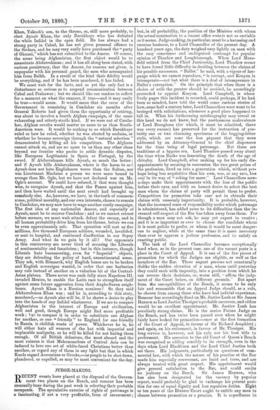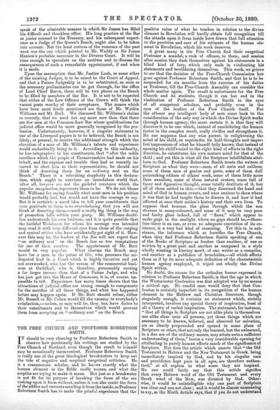JUDGE-MAKING.
DECENT events have placed at the disposal of the Govern-
ment two places on the Bench, and rumour has been unusually busy during the past week in selecting their probable Occupants. The speculative exercise of rights of patronage is a fascinating, if not a very profitable, form of amusement ;
but, in all probability, the position of the Minister with whom the actual nomination to a vacant office rests is not so enviable
as it seems. Judge-making, in particular, must be a harassing and onerous business, to a Lord Chancellor of the present day. A hundred years ago, the duty weighed very lightly on men with
the easy conscience and undisguised contempt for popular opinion of Thurlow and Loughborough. When Lord Mans- field retired from the Chief Justiceship, Lord Thurlow seems to have found little difficulty in deciding between the claims of his possible successors. "Buller," he said, with a vigour of lan- guage which we cannot reproduce, "is corrupt, and Kenyon is
intemperate—not but what there is a deal of intemperance in Buller's corruption." On the principle that when there is a choice of evils the greater should be avoided, he accordingly proceeded to appoint Kenyon. Lord Campbell, in whose
lively pages this incident is recorded, could perhaps, if he haa been so minded, have told the world some curious stories of how, some half a century later, Lord Chancellors were wont to be besieged with solicitations, whenever a good place happened to fall in. What his fortheoming autobiography may reveal on this head we do not know, but the posthumous malevolence of Lord Brougham (for which, it must be admitted, there was every excuse) has preserved for the instruction of pos- terity one or two charming specimens of the begging-letter style, which are none the less piquant that they were addressed by an Attorney-General to the chief dispensers for the time being of legal patronage. But these are traditions of a bygone era. Lord Thurlow passed away about the time when Burke was lamenting the death of the age of chivalry. Lord Campbell, after making up for his early dis- appointments by securing in succession the two great prizes of the profession, lived on into a generation which, without per- haps being less acquisitive than his own, was, at any rate, less na' in its way of "asking for more." Lord Chancellors now- a-days make their appointments with the fear of the public before their eyes, and with an honest desire to select the best man whom the claims of party will permit them to prefer.
Competitors for promotion take care not to obtrude their claims with unseemly importunity. It is probable, however, that the increased sense of responsibility under which patronage is administered, has added more to its difficulties than the in- creased self-respect of the Bar has taken away from them. For though a man may not ask, he may yet expect to receive ;
and it is as important as ever to choose the candidate whom, it is most politic to prefer, or whom it would be most danger-
ous to neglect, while at the same time it is more necessary than ever to appease a jealous profession, and to satisfy an exacting public.
The task of the Lord Chancellor becomes exceptionally hard when, as in the present case, one of the vacant posts is a place in the Court of Appeal. It is one of the few pieces of promotion for which the Judges are eligible, as well as the members of the Bar. Those august persons not unnaturally dislike the sudden elevation of a man, whom until yesterday
they could snub with impunity, into a position from which he can reverse their decisions, or, worse still, "affirm the judg- ment of the Court below, on different grounds." But apart from the susceptibilities of the Bench, it seems to be only
fair and reasonable that an Appeal Judge should, as a rule, be chosen from among those who have had judicial experience.
Rumour has accordingly fixed on Mr. Justice Lush or Sir James Hannen as Lord Justice Thesiger's probable successor, and either would be an excellent appointment. Mr. Justice Lush has peculiarly strong claims. He is the senior Puisne Judge on the Bench, and has twice been passed over when he might fairly have looked for promotion—once at the first formation of the Court of Appeal, in favour of Sir Richard Amphlett ;
and again, on his retirement, in favour of Mr. Thesiger. His long service is, however, not his only nor his best title to
preferment. His accession to the old Court of Queen's Bench-
was recognised as adding sensibly to its strength, even in the days when Lord Blackburn and the Lord Chief Justice both sat there. His judgments, particularly on questions of com- mercial law, with which the nature of his practice at the Bar made him especially conversant, are lucid and terse, and are
always treated with great respect. His appointment would give general satisfaction to the Bar, and could excite no jealousy on the Bench. Sir James Hannen, who has also been designated for the vacancy by popular
report, would probably be glad to exchange his present posi- tion for one of equal dignity and less repulsive duties. Eight or ten years of the Divorce Court ought to entitle any man to choose between promotion or a pension. It is superfluous to speak of the admirable manner in which Sir James has filled his difficult and thankless office. His long practice at the Bar as junior counsel to the Treasury, and his subsequent experi- ence as a Judge of the Queen's Bench, ought also to be taken into account. Not the least curious of the rumours of the past week was the one which pointed to Mr. Waddy as Sir James Hannen's probable successor in the Divorce Court. It will be time enough to speculate on the motives and .to discuss the consequences of such a remarkable appointment, if and when it is made.
Upon the assumption that Mr. Justice Lush, or some other of the existing Judges, is to be raised to the Court of Appeal, and that a Puisne Judgeship is to be substituted, as soon as the necessary preliminaries can be got through, for the office of Lord Chief Baron, there will be two places on the Bench to be filled by members of the Bar. It is not to be expected that either of the Law Officers of the Crown will think the vacant posts worthy of their acceptance. The names which have been most freely mentioned are those of Mr. Watkin Williams and Mr. Butt. We discussed Mr. Williams's claims so recently, that we need not say more now than. that there are few men at the Common-Law Bar whose qualifications for judicial office would be more generally recognised by the pro- fession. Unfortunately, however, if a singular statement in one of the Liverpool papers is to be believed, the Bench is not likely, at present, to receive the additional strength which the elevation of a man of Mr. Williams's talents and experience would undoubtedly bring to it. According to this authority, he has telegraphed to his constituents, that "after the noble sacrifices which the people of Carnarvonshire had made on his behalf, and the expense and trouble they had so recently in- curred to elect him as their representative, he should not think of deserting them for an ordinary seat on the Bench." There is a refreshing simplicity in this declara- tion, which ought to convince an incredulous world that, after all, lawyers arc not the guileful creatures which the popular imagination represents them to be. We do not blame Mr. Williams for saying frankly what most men in his position would probably feel, but would not have the courage to say. But it is certainly a novel idea to tell your constituents that your gratitude to them is so overwhelming that you will not think of deserting them,—until a really big thing in the way of promotion falls within your grasp. Mr. Williams doubt- less understands his own business, and it is quite possible that the faithful Welshmen for whom his message was intended may read it with very different eyes from those of the carping and cynical critics who have accidentally got sight of it. How- ever this may be, the leaders of the Bar will not regret that "an ordinary seat" on the Bench has so few temptations for one of their number. The appointment of Mr. Butt would be very popular. What charms the Bench may have for a man in the prime of life, who possesses the un- disputed lead in a Court which is highly lucrative and yet not overworked, who has the cream of the commercial busi- ness at Guildhall, who is, therefore presumably earning
a far larger income than that of a therefore, Judge, and who has just got into the House of Commons, it is, of course, im- possible to tell. Experience has many times shown that the attractions of judicial office are strong enough to compensate for the sacrifice of all these things, and what has happened before may happen again. If Mr. Butt should refuse, either Mr. Russell or Mr. Cohen would fill the vacancy to everybody's satisfaction,—unless, as may well be, they, too, have duties to their constituents and to themselves which would prevent them from accepting an "ordinary seat" on the Bench.







































 Previous page
Previous page